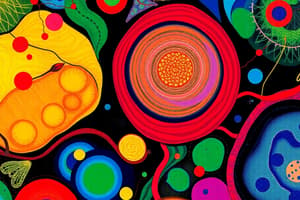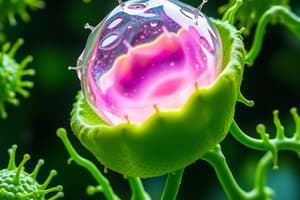Podcast
Questions and Answers
What is the basic unit of life?
What is the basic unit of life?
- Tissue
- Organ
- Organ System
- Cell (correct)
What is an organism composed of?
What is an organism composed of?
- A group of populations
- A group of tissues
- A group of ecosystems
- A group of cells (correct)
Which process allows an organism to maintain a stable internal environment?
Which process allows an organism to maintain a stable internal environment?
- Adaptation
- Growth and Development
- Reproduction
- Homeostasis (correct)
What is the term for a group of organisms of the same species in a specific area?
What is the term for a group of organisms of the same species in a specific area?
Which of the following processes is central to evolution?
Which of the following processes is central to evolution?
What is the basic unit of structure and function in living organisms?
What is the basic unit of structure and function in living organisms?
Which process leads to the change in populations over time through natural selection?
Which process leads to the change in populations over time through natural selection?
What does DNA primarily determine in an organism?
What does DNA primarily determine in an organism?
Which branch of biology focuses on the interactions between organisms and their environment?
Which branch of biology focuses on the interactions between organisms and their environment?
What is meant by homeostasis in biological systems?
What is meant by homeostasis in biological systems?
What is the study of cells called?
What is the study of cells called?
Which level of biological organization comes after molecules?
Which level of biological organization comes after molecules?
Which process includes both breaking down and building up of molecules within an organism?
Which process includes both breaking down and building up of molecules within an organism?
Flashcards
Cell
Cell
The basic building block of life.
Organism
Organism
A single living thing.
Reproduction
Reproduction
How living things make more of themselves.
Adaptation
Adaptation
Signup and view all the flashcards
Homeostasis
Homeostasis
Signup and view all the flashcards
Biology Definition
Biology Definition
Signup and view all the flashcards
Cell Theory
Cell Theory
Signup and view all the flashcards
Evolution
Evolution
Signup and view all the flashcards
DNA Function
DNA Function
Signup and view all the flashcards
Metabolism
Metabolism
Signup and view all the flashcards
Molecule
Molecule
Signup and view all the flashcards
Organelle
Organelle
Signup and view all the flashcards
Study Notes
Introduction to Biology
- Biology is the study of life and living organisms.
- It encompasses a vast range of topics, from the smallest microorganisms to the largest ecosystems.
- Key areas of study include: cells, genetics, evolution, ecology, and many more.
Key Concepts in Biology
- Cell Theory: All living organisms are composed of cells; cells are the basic units of structure and function in living organisms; all cells come from pre-existing cells.
- Evolution: The process by which populations of organisms change over time. This change is driven by natural selection, where favorable traits are more likely to be passed on to future generations.
- DNA: The molecule that carries genetic information. DNA determines the traits of an organism.
- Homeostasis: The ability of an organism to maintain a stable internal environment despite changes in the external environment. Maintaining stable internal conditions like temperature and water content is achieved through various processes.
- Metabolism: The sum of all chemical reactions that occur within an organism. This encompasses both breaking down (catabolism) and building up (anabolism) of molecules.
- Genetics: The study of genes, heredity, and variation in organisms. Includes the principles of Mendelian inheritance, the structure and function of DNA, gene expression, and the mechanisms of heredity.
Branches of Biology
- Molecular Biology: Studies the structure and function of biological molecules, such as proteins and DNA.
- Cell Biology: Studies the structure and function of cells.
- Genetics: Deals with the principles of heredity and variation.
- Evolutionary Biology: Focuses on the processes that have shaped the diversity of life.
- Ecology: Studies the interactions between organisms and their environment.
- Physiology: Studies the functions of living organisms, including the functioning of organs and organ systems.
- Biochemistry: Focuses on the chemical processes of living organisms.
- Botany: The study of plants.
- Zoology: The study of animals.
- Microbiology: Focuses on microorganisms such as bacteria, viruses, fungi, and protists.
Levels of Biological Organization
- Atom: The basic unit of matter.
- Molecule: Formed by the combination of atoms.
- Macromolecule: Large molecules like proteins, carbohydrates, and lipids.
- Organelle: Structures within a cell with specific functions (e.g., mitochondria, nucleus).
- Cell: The basic unit of life.
- Tissue: A group of similar cells working together to perform a specific function.
- Organ: A group of tissues working together to perform a specific function.
- Organ System: A group of organs working together to perform a specific function.
- Organism: An individual living thing.
- Population: A group of organisms of the same species in a given area.
- Community: All interacting populations in a given area.
- Ecosystem: All living and non-living components in a given area.
- Biosphere: The global sum of all ecosystems on Earth.
Fundamental Processes in Living Organisms
- Reproduction: The process by which organisms produce offspring.
- Growth and Development: The increase in size and complexity of an organism.
- Response to Stimuli: Organisms respond to changes in their environment.
- Adaptation: The ability of organisms to change over time in response to their environment. This process is central to evolution.
- Homeostasis (repeated): Maintenance of a stable internal environment.
Studying That Suits You
Use AI to generate personalized quizzes and flashcards to suit your learning preferences.




